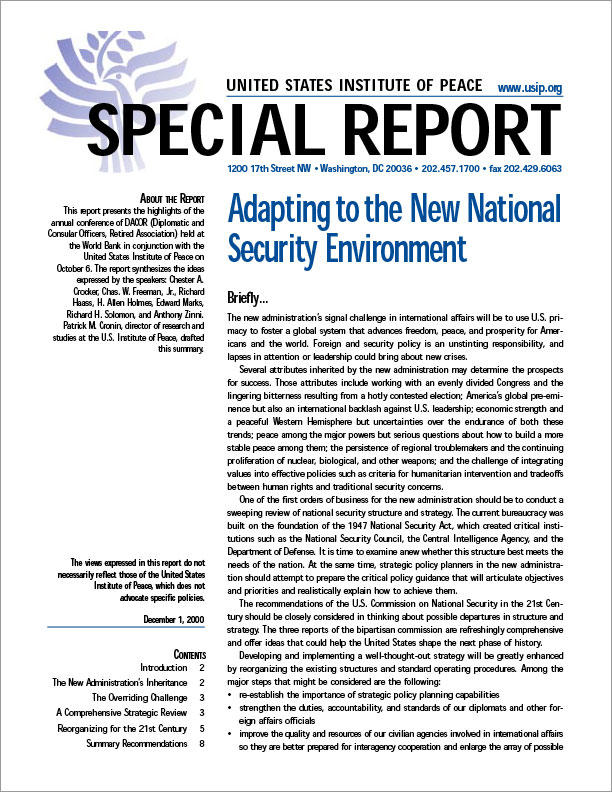
Summary
The new administration's signal challenge in international affairs will be to use U.S. primacy to foster a global system that advances freedom, peace, and prosperity for Americans and the world. Foreign and security policy is an unstinting responsibility, and lapses in attention or leadership could bring about new crises.
Several attributes inherited by the new administration may determine the prospects for success. Those attributes include working with an evenly divided Congress and the lingering bitterness resulting from a hotly contested election; America's global pre-eminence but also an international backlash against U.S. leadership; economic strength and a peaceful Western Hemisphere but uncertainties over the endurance of both these trends; peace among the major powers but serious questions about how to build a more stable peace among them; the persistence of regional troublemakers and the continuing proliferation of nuclear, biological, and other weapons; and the challenge of integrating values into effective policies such as criteria for humanitarian intervention and tradeoffs between human rights and traditional security concerns.
One of the first orders of business for the new administration should be to conduct a sweeping review of national security structure and strategy. The current bureaucracy was built on the foundation of the 1947 National Security Act, which created critical institutions such as the National Security Council, the Central Intelligence Agency, and the Department of Defense. It is time to examine anew whether this structure best meets the needs of the nation. At the same time, strategic policy planners in the new administration should attempt to prepare the critical policy guidance that will articulate objectives and priorities and realistically explain how to achieve them.
The recommendations of the U.S. Commission on National Security in the 21st Century should be closely considered in thinking about possible departures in structure and strategy. The three reports of the bipartisan commission are refreshingly comprehensive and offer ideas that could help the United States shape the next phase of history.
Developing and implementing a well-thought-out strategy will be greatly enhanced by reorganizing the existing structures and standard operating procedures. Among the major steps that might be considered are the following:
- re-establish the importance of strategic policy planning capabilities;
- strengthen the duties, accountability, and standards of our diplomats and other foreign affairs officials;
- improve the quality and resources of our civilian agencies involved in international affairs so they are better prepared for interagency cooperation and enlarge the array of possible instruments of policy to include better use of public diplomacy and political tools;
- clarify the role of the Armed Forces, which are caught between two paradigms--retaining decisive force to win large wars, and providing a reaction force for humanitarian interventions;
- incorporate new instruments of policy into the traditional portfolio of military and diplomatic instruments;
- cultivate coalitions of the willing and actively tend to them to advance U.S. interests.
About the Report
This report presents the highlights of the annual conference of DACOR (Diplomatic and Consular Officers, Retired Association) held at the World Bank in conjunction with the United States Institute of Peace on October 6. The report synthesizes the ideas expressed by the speakers: Chester A. Crocker, Chas. W. Freeman, Jr., Richard Haass, H. Allen Holmes, Edward Marks, Richard H. Solomon, and Anthony Zinni. Patrick M. Cronin, director of research and studies at the U.S. Institute of Peace, drafted this summary.
The views expressed in this report do not necessarily reflect those of the United States Institute of Peace, which does not advocate specific policies.